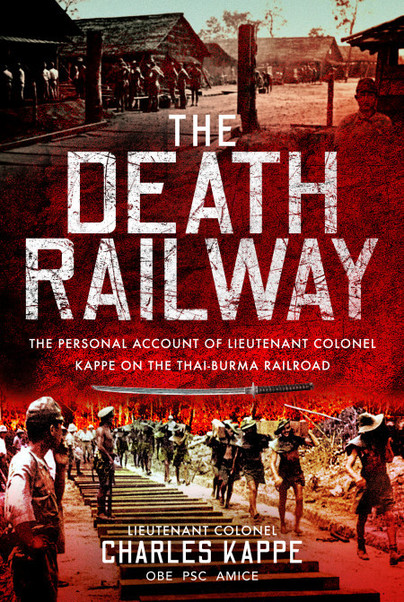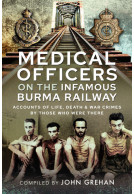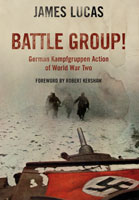The Death Railway (Hardback)
The Personal Account of Lieutenant Colonel Kappe on the Thai-Burma Railroad

Pages: 192
Illustrations: 32 black and white illustrations
ISBN: 9781399017770
Published: 9th February 2022
(click here for international delivery rates)
Need a currency converter? Check XE.com for live rates
| Other formats available - Buy the Hardback and get the eBook for £1.99! | Price |
|---|---|
| The Death Railway eBook (3.6 MB) Add to Basket | £6.99 |
They had faced the indignity of surrender and the squalor of Changi prison, so the spirits of the British and American troops lifted when they were told that they would be transferred to another healthier location where conditions would be more benign and food far more abundant. A total of 7,000 men, approximately half British and half Australian, were to be moved, the men being told that they would not be compelled to work. As there were not that number of fit men at Changi, many weak and unwell soldiers formed part of the group that was designated ‘F’ Force.
From the outset, the prisoners realized that none of the promises the Japanese had made would be fulfilled. Herded into trucks, they were transported on a nightmare rail journey into Thailand and then marched for hundreds of miles along a jungle track through the torrential monsoon rains to miserable camps where there was little in the way of cover or accommodation.
Despite utter exhaustion, upon arrival at the camps, the men were forced to work on the road and rail links the Japanese needed to carry supplies and reinforcements for their assault upon British-held India. With precious little food or medical supplies, the men soon fell prey to terrible and fatal diseases and soon hundreds had died. Despite the protests of the British and Australian officers, conditions in the malaria and cholera infested camps were utterly horrific. As Lieutenant Colonel Kappe wrote, the ‘barbarism’ they experienced at the hands of the Japanese had never ‘been equaled … in history’.
Kappe, therefore, set himself the task of documenting the atrocities the men of ‘F’ Force endured from May to October 1943, which resulted in more than 3,000 men losing their lives. His report is reproduced here in full – every disturbing episode in this almost unbelievable drama, told as he saw and experienced it at first hand. Rarely has there been such a document produced in a prisoner of war camp, its survival being as monumental as the sufferings of the men described in its pages.
Rating: 5 out of 5 stars
NetGalley, caroline wright
I have recently visited part of the railway and have become very interested in the history. This was a very heartwarming story and it has been an honour to read.
Kappe’s report was used as evidence in War Crimes Trials and correlates with Captain Bennett’s detailed Unit Diary of the horrors endured by the men of ‘F’-Force and makes for chilling reading of inhumanity at its worst.
RUSI Defence Systems Journal - June 2023 quarterly Newsletter
On 17th February 1942, the booming voice of Winston Churchill, on BBC radio, announced to the world that
Richard Gough - Historian, writer, author of the Escape from Singapore, The jungle was Red, Outpost of the Empire, SOE Singapore 1941-42. Waiting publication Tony Poe, CIA Paramilitary in SE Asia.
Singapore's military garrison of almost 100,000 men had surrendered to a Japanese invasion force of 30,000 men.
On 4th March 1962, the Dutch East Indies (Indonesia) surrendered to the Japanese. Hundreds more were
taken prisoner. The Japanese next drove the British army out of Burma, with every intension of reaching India.
The Japanese faced a logistic problem, it needed reinforcements and supplies. It also had thousands of wounded Japanese soldiers, needing to be fed and hospital treatment. To overcome dual problem the Imperial Japanese Army decided to build a railway, the Burma Siam railway., or as Lt. Col. Charles Kappe calls THE DEATH RAILWAY.
There a number of books written by survivors who slaved on the railway but Charles Kappe book is the first that gives a comprehensive account of the death railway.
An absorbing read.
I still found it interesting and informative. I'm sure many on here with an interest in this conflict will find it worth reading.
Arrse
Read the full review here
Having met and worked with a survivor of this nightmare, I found some of it difficult to read and assimilate. Unbelievable inhumanity on an enormous scale.
Books Monthly
This is one of those books that you read and you’re glad you never had to experience any of that. The lack of food, clothing and treatment would you would think send you mad and then to couple it with extreme heat and varying diseases is unimaginable. In a way, if you hadn’t read this book it would be hard to believe it or imagine when you think there used to be rules in place for looking after prisoners of war. This book reminded me of the film The Bridge Over the River Kwai in places, but I don’t think you can really understand how harsh it was unless you were there. Although this wasn’t a pleasant read, I’m glad I did, and enjoyed the writing of Lt Col Charles Kappe certainly a book for those interested in WW2 in the Far East.
UK Historian
Read the full review here
As featured in
The Bookseller
The Death Railway is an accurate account of Lieutenant Colonel Charles Kappe. He experienced the atrocities of the PsOW that the Japanese forced to build a railway through Western Thailand to Myanmar.
NetGalley, Meradith Thayer
The terrain of this area was rugged, the temperature was hot, and the treatment of these men was abysmal. What these prisoners underwent was horrific and unimaginable... If you are interested in WWII history that is more obscure and less talked about, this is a great book to read! It was very educational but also truthfully graphic.
About Lt Col Charles Kappe
Lieutenant Colonel Charles KAPPE OBE, PSC, AMICE, was born on 3 December 1990 at Balarat in the Australian state of Victoria. He was educated at Ballarat High School, where he later commanded the school’s Cadet Corps. He joined the Australian Army before the war, graduating from Staff College to eventually become the 8th Australian Division's chief signals officer. As well as compiling his report on ‘F’ Force, Kappe was given the task of compiling the Australian war diaries of the campaign which ended with the fall of Singapore to the Japanese. This resulted in a 200,000-word history The Malayan Campaign written in Changi and in Thailand between 1942 and 1945. It was the first full history of the Malaya-Singapore campaign to be written by a participant, though it has only been published in part and in an abridged version. He died at the age of 66 on 23 October 1967.















